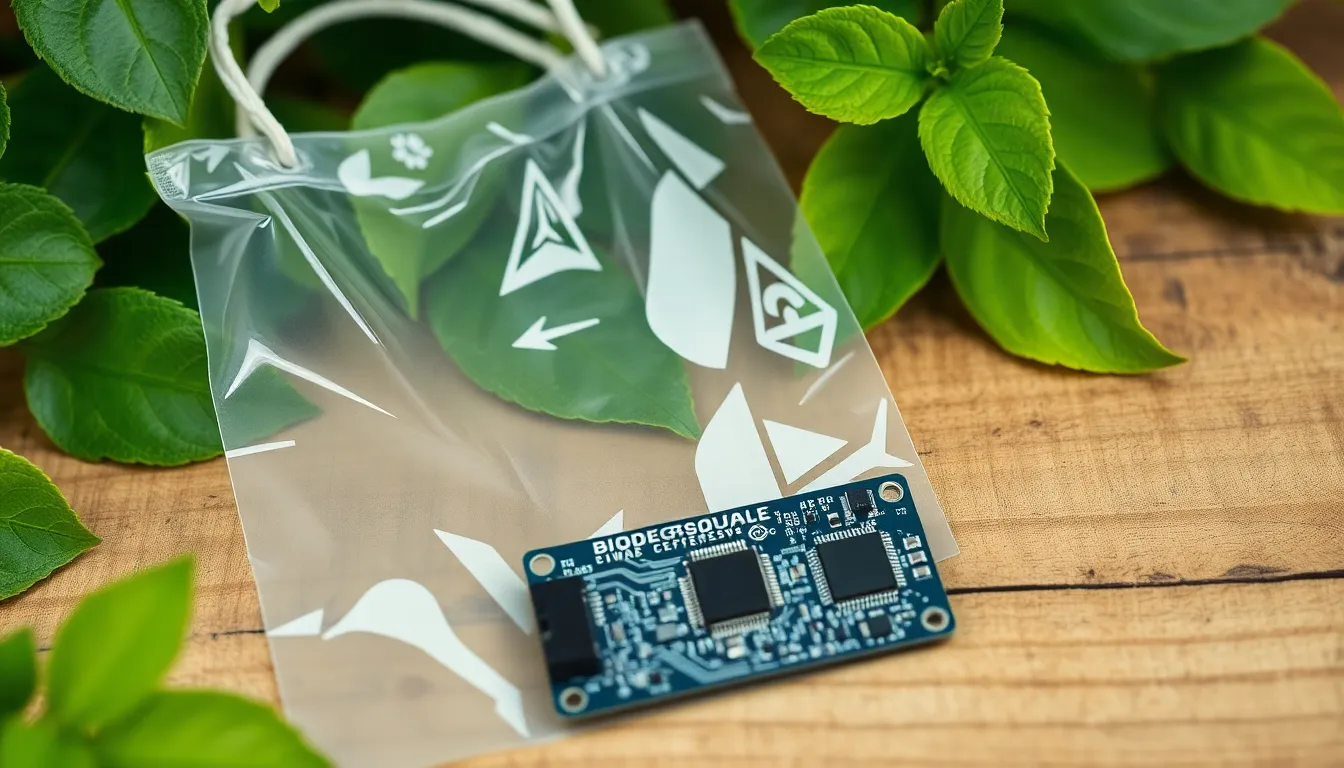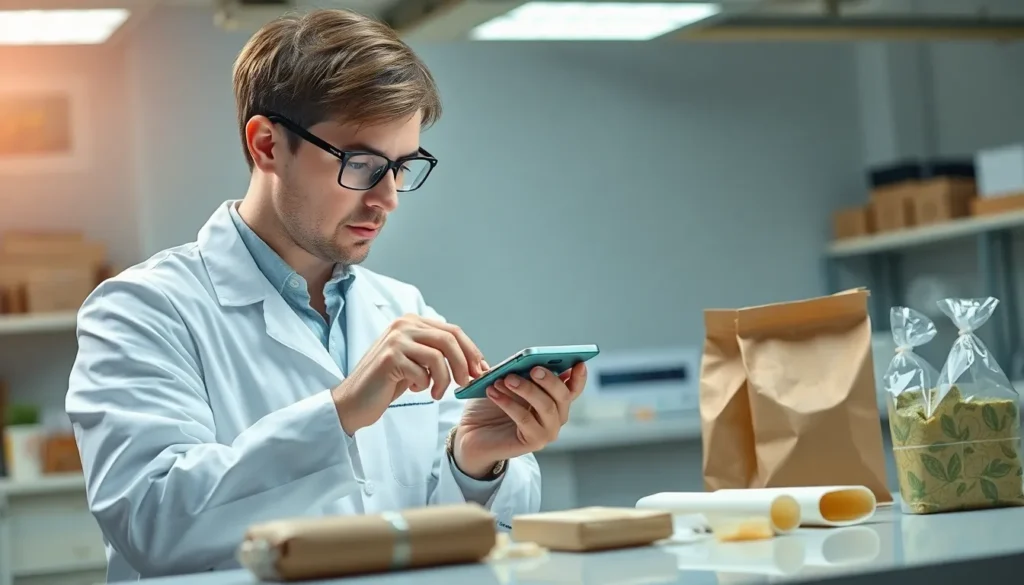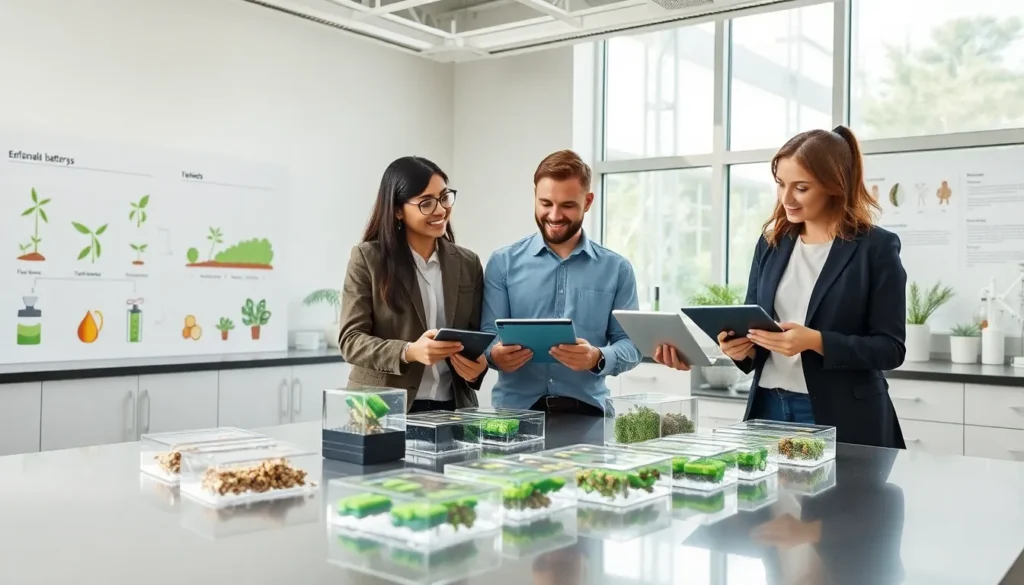Table of Contents
ToggleIn a world drowning in plastic, biodegradable tech emerges like a superhero ready to save the day. Imagine gadgets that don’t just serve a purpose but also vanish without a trace, leaving Mother Nature smiling instead of frowning. It’s not just a dream; it’s the future of technology, and it’s more exciting than finding an extra fry at the bottom of the bag.
Overview of Biodegradable Tech
Biodegradable technology represents a significant advancement in addressing plastic pollution. By focusing on products that naturally decompose, it prioritizes environmental health.
Definition and Importance
Biodegradable tech refers to materials designed to break down through natural processes. Importance lies in reducing landfill waste and minimizing environmental impact. These technologies contribute to sustainable practices, aligning with global efforts to combat pollution. When products naturally decompose, they return nutrients to the soil, enhancing ecosystem health. This shift creates a viable alternative to traditional plastics.
Current Trends in Biodegradable Tech
Current trends highlight significant developments in biodegradable tech. Companies are innovating biodegradable packaging solutions that replace conventional plastics. Research indicates rapid growth in bioplastics, derived from renewable resources like cornstarch and sugarcane. Many tech manufacturers explore biodegradable components in electronic devices, such as casings and circuit boards. Consumer interest in sustainable products fuels this evolution, pushing industries to adopt greener technologies.
Types of Biodegradable Tech



Biodegradable technology encompasses various innovative products designed to reduce environmental impact. Understanding these types is essential for recognizing their significance in promoting sustainability.
Biodegradable Plastics
Biodegradable plastics consist of materials that decompose naturally through microbial action. These plastics, made from renewable resources, serve as alternatives to conventional petroleum-based options. Products like shopping bags, food containers, and wraps utilize biodegradable plastics, reducing landfill waste and pollution. Compostable variants break down into non-toxic components, enriching soil instead of contributing to environmental harm. Researchers continue to enhance the biodegradation process, shortening breakdown times and increasing efficiency, making biodegradable plastics a promising solution.
Biodegradable Electronics
Biodegradable electronics focus on integrating organic materials into electronic devices, providing a solution to electronic waste. Components in devices, such as circuit boards and casings, utilize biodegradable materials that decompose safely after disposal. Innovations in this field include flexible electronics made from organic semiconductors, allowing manufacturers to produce sustainable devices without compromising functionality. As consumers embrace eco-friendly alternatives, the growth of biodegradable electronics highlights the industry’s shift towards greener technologies, aligning electronic manufacturing with environmental priorities.
Benefits of Biodegradable Tech
Biodegradable technology brings substantial advantages that extend to environmental and economic realms.
Environmental Impact
Biodegradable tech significantly reduces plastic pollution. Plastic products often end up in landfills, harming ecosystems. By using materials that decompose naturally, these technologies help return nutrients to the soil. Innovations in this field address electronic waste, mitigating the environmental footprint of discarded devices. As biodegradable electronics feature components that break down safely, their adoption contributes to a healthier planet. Sustainable practices associated with these products support global efforts to combat pollution.
Economic Advantages
Economic benefits accompany the rise of biodegradable tech. Manufacturers can reduce waste disposal costs through the use of biodegradable materials. These sustainable options often attract environmentally conscious consumers, boosting sales. By aligning with green practices, companies may also gain a competitive edge in the market. Job creation in the biodegradable sector presents further economic opportunities, as demand for sustainable products increases. Investment in biodegradable technology can stimulate local economies while supporting a transition to greener operations.
Challenges in Biodegradable Tech
Biodegradable technology faces several challenges that hinder widespread adoption. Addressing these hurdles is essential for maximizing its potential.
Production Costs
Production costs for biodegradable materials often exceed those of traditional plastics. Manufacturers encounter higher expenses when sourcing sustainable raw materials. Many companies face challenges in scaling production efficiently. Increased complexity in manufacturing processes can further elevate costs. As a result, consumers might see higher prices for biodegradable products, limiting market penetration. Streamlining production methods is critical to reducing these costs and encouraging broader adoption of biodegradable alternatives.
Consumer Awareness
Consumer awareness plays a pivotal role in the success of biodegradable tech. Many individuals remain uninformed about the benefits of biodegradable products. Educating consumers on environmental impacts can enhance demand for these sustainable options. Companies producing biodegradable tech must invest in marketing strategies to highlight their advantages. Effective campaigns can lead to increased understanding and support. Building a knowledgeable consumer base enhances the market viability of biodegradable solutions.
Future Prospects of Biodegradable Tech
The future of biodegradable technology promises exciting advancements aimed at reducing environmental impact. Innovations continue to emerge, enhancing the functionality and appeal of biodegradable solutions.
Innovations on the Horizon
Developments in biodegradable tech focus on enhancing user experience while maintaining sustainability. Researchers are exploring advanced materials that degrade faster and offer improved performance. In particular, organic semiconductors show potential for biodegradable electronics, as they may replace traditional components. Startups are introducing eco-friendly packaging solutions that not only protect products but also break down efficiently after use. Emerging technologies like 3D printing with biodegradable inks present opportunities for customized, sustainable production. Overall, innovations are paving the way for a greener future in technology.
Potential Market Growth
Market forecasts indicate significant growth for biodegradable tech in various industries. Analysts project a compound annual growth rate (CAGR) of 20% for biodegradable plastics from 2021 to 2028. Consumers actively seek sustainable products, prompting manufacturers to invest in greener alternatives. In particular, the global market for bioplastics is set to reach $44 billion by 2026. Tech companies recognize the benefits of adopting biodegradable materials to capture eco-conscious consumers. As businesses embrace these shifts, they stimulate local economies and contribute to environmental health.
Biodegradable technology stands at the forefront of the fight against plastic pollution. By offering sustainable alternatives that decompose naturally, it paves the way for a cleaner environment and a healthier planet. As innovations continue to emerge in biodegradable plastics and electronics, the potential for significant impact grows.
The shift towards these eco-friendly solutions not only addresses environmental concerns but also opens up new economic opportunities. With increasing consumer demand for sustainable products, manufacturers are encouraged to invest in greener technologies. This evolution in tech reflects a broader commitment to environmental stewardship and sustainability, making biodegradable tech a vital component of future advancements.




